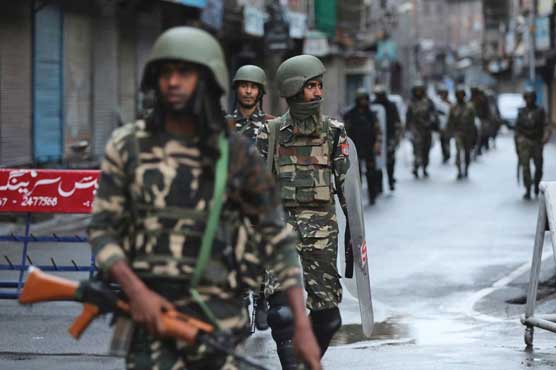Supplies run low as Kashmir remains paralyzed by lockdown for 14th day

Thousands of people have been arrested by the Indian forces over the past two weeks.
SRINAGAR (Dunya News) – Life remains paralyzed and the people were facing the shortage of food and medicines in the Indian-occupied Kashmir as the communication blackout continued on the 14th consecutive day on Sunday.
Millions of residents in the Kashmir Valley – one of the most militarized regions in the world – are living behind a virtual curtain. Unable to access the internet, send letters, or even make calls using a fixed line, India s most volatile region has vanished from the modern world.
The Indian government snapped television, telephone and internet links to prevent demonstrations against its decision of revoking Article 370 of the Indian Constitution that granted special status to Jammu and Kashmir.
According to reports, one person was martyred and scores injured during clashes between Indian troops and protesters who defied curfew orders and other restrictions.
Two senior government officials confirmed that at least two dozen people were admitted to hospitals with pellet injuries. The heavy clashes broke out in around two dozen places in Srinagar including Soura, Rainawari, Nowhetta and Gojwara areas of the city.
Thousands of people have been arrested by the Indian forces over the past two weeks.
The curfew was enforced after Indian government-led by PM Narendra Modi had revoked Article 370 on Monday (August 5). Before that, the occupation authorities had clamped an unprecedented communications blackout on the territory and arrested many political leaders.
Meanwhile, the Indian authorities continue to clamp curfew and other restrictions across occupied Kashmir by converting it into a military garrison and a big concentration camp by deploying Indian troops and police personnel in every nook and corner of the territory.
As a result of strict curfew and all sorts of communication blockade, a humanitarian crisis is unfolding as people are facing severe shortage of essential commodities including baby food and life-saving medicines in the occupied territory.
Almost all Hurriyat leaders, including Syed Ali Gilani and Mirwaiz Umar Farooq continue to remain under house arrest or in jails.
On the other hand, thousands of people have been detained in Indian Kashmir over fears of unrest after New Delhi stripped the region of its autonomy two weeks ago, government sources said.
A magistrate said at least 4,000 people were arrested and held under the Public Safety Act (PSA), a controversial law that allows authorities to imprison someone for up to two years without charge or trial.
"Most of them were flown out of Kashmir because prisons here have run out of capacity," the magistrate said, adding that he had used a satellite phone allocated to him to collate the figures from colleagues across the Himalayan territory amid a communications blackout and lockdown imposed by authorities.
The revelations came as the family of a timber trader alleged he died after suffocating from tear gas fired by security forces.
India reimposes movement curbs
Earlier today, Indian authorities reimposed restrictions on movement in major parts of Kashmir’s biggest city, Srinagar, after violent overnight clashes between residents and police in which dozens were injured, two senior officials and eyewitnesses said.
In the past 24 hours, there has been a series of protests against New Delhi’s Aug. 5 revocation of the region’s autonomy. This followed an easing in curbs on movement.
The state government has said that it has not imposed a curfew over the past two weeks, but on Sunday people were being turned back at multiple roadblocks set up in the city in the past few hours. Security forces at some roadblocks have told residents there is a curfew.
Two senior government officials told Reuters that at least two dozen people were admitted to hospitals with pellet injuries after violent clashes broke out in the old city on Saturday night.
Representatives in the Jammu and Kashmir government in Srinagar and the federal government in New Delhi did not immediately return calls asking about the latest clampdown or seeking an assessment of the number of injuries and clashes.
One of the official sources said that people pelted security forces with stones in around two dozen places across Srinagar. He said that the intensity of the stone pelting protests has increased over past few days.
Chilly Grenades
The heavy overnight clashes took place mostly in Rainawari, Nowhetta and Gojwara areas of the old city where Indian troops fired tear smoke, chilly grenades and pellets to disperse protesters, eyewitnesses and officials said.
Chilly grenades contain very spicy chili pepper, and produce a major eye and skin irritant, as well as a pungent smell, when they are unleashed.
The officials, who declined to be identified because they aren’t supposed to talk to the media, said clashes also took place in other parts of the city including Soura, a hotbed of protests in the past two weeks.
A senior government official and hospital authorities at Srinagar’s main hospital said that at least 17 people came there with pellet injuries. They said 12 were discharged while five with grievous injuries were admitted.
The hospital officials and a police officer told Reuters that a 65-year-old man, Mohammad Ayub of Braripora, was admitted to the hospital after he had major breathing difficulties when tear gas and chilly grenades were fired in old city area on Saturday afternoon. He died in the hospital on Saturday night and has already been buried, they said.

